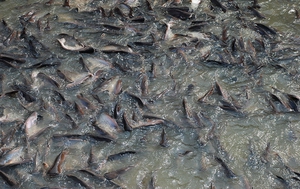 ening to complicate efforts by the United States to reach a major trade agreement with 11 Pacific nations by the end of the year - catfish.
ening to complicate efforts by the United States to reach a major trade agreement with 11 Pacific nations by the end of the year - catfish.At issue is a pending new catfish inspection programme at the US Department of Agriculture that would replace but cost far more than an existing scheme run by the Food and Drug Administration. US catfish farmers say the new programme would be more rigorous than the one at the FDA and is needed to make sure all domestic and imported catfish are safe for consumers to eat.
Vietnam, a large exporter of catfish and one of the nations in the trade talks, says it is nothing more than a trade barrier in disguise.
"And it's not even a good disguise, it's clearly a thinly veiled attempt designed to keep out fish from countries like Vietnam," said Le Chi Dzung, who heads the economics section at the Vietnamese embassy in Washington.
Last week Vietnamese trade officials wrote to US Secretary of State John Kerry, the White House and members of Congress and threatened trade retaliation if the programme was not repealed.
"Our government is unwilling to sit by as this programme is implemented," the trade officials wrote, adding that American exports of beef, soybeans and other goods to Vietnam could suffer as a result.
Chinese business leaders have also voiced their opposition to the programme. In an August 29 editorial in The Wall Street Journal, Bian Zhenhu, president of the China Chamber of Commerce for Import and Exports of Foodstuffs, a Chinese business trade group, warned that the catfish inspection programme could lead to new barriers against American exports.
"Targeting catfish exports from Asia to cater to narrow special interest puts at risk America's growing farm exports to China," Bian wrote.
Although catfish make up only a small part of the commerce among the 12 nations involved in the trade talks, called the Trans-Pacific Partnership, they are a vital industry to Vietnam, where they accounted for US$340 million of the country's US$1.3 billion in fish exports to the United States last year. They make up more than 60 per cent of the US market and are blamed for putting many domestic catfish farmers out of business.
Vietnam's vehemence against the programme "could impact the talks", said John Ciorciari, assistant professor at the Gerald R. Ford School of Public Policy at the University of Michigan. Ciorciari said that catfish alone would not derail the negotiations, but that "it's going to be hard for the US to get any kind of trade concessions while it has a programme like this".
Jeffery Schott, a senior fellow at the Peterson Institute for International Economics in Washington, who is co-author of a book on the Trans-Pacific Partnership, agreed that the catfish issue alone would not be enough to hold up the trade deal.
"But of all the countries involved in the talks, Vietnam is going to have to do the most in terms of changing its policies to comply with any trade agreement obligations," Schott said, adding that the Vietnamese were using the same argument that the US made against other countries that it accused of creating artificial trade barriers.





